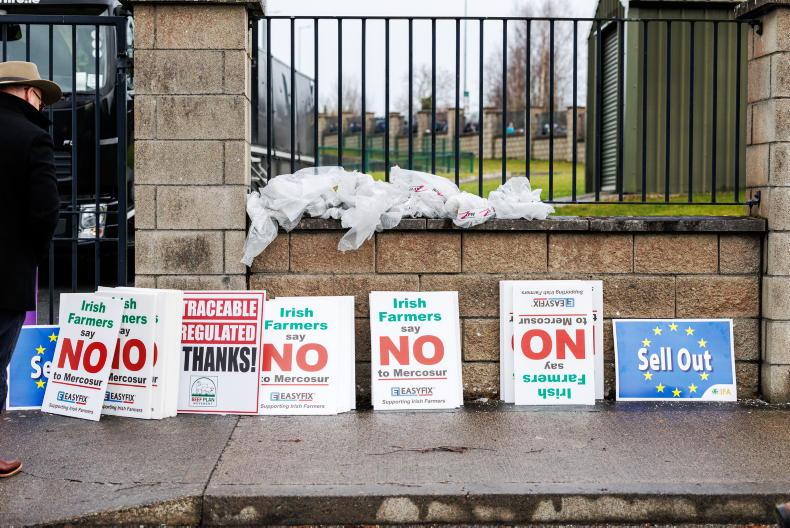While walking along Spencer Dock in Dublin last week with my two young daughters we fell into step with the “East Wall protesters”. We were going to “Toy Show the Musical” in the Convention Centre - they were marching toward Samuel Beckett Bridge where they stopped, blocking the traffic. The group was small and it was peaceful - more curious than scary for the kids. “What are they doing Mammy”, they enquired? “Protesting honey, keep walking”, I replied. There was a jokey shout that “the show is off kids”; a few taxis honked their horns in support (I think) and one lady passing us called the group “nut jobs” to her friend. It was this comment that provoked my nine-year-old to ask what the protest was actually about. I agree with the right to protest, even when I don’t agree with the reason and I wanted her to understand that. This protest expressed genuine concerns that need to be addressed by government regarding shortages of suitable refugee accommodation, housing, school places and doctors – issues that are endemic across the country. But there is also a trace of racism and NIMBY-ism (not in my back yard) to the placing of refugees.
I gave her my best answer and then she asked why the Gardaí were allowing them to stop the traffic. This was of most concern as her cousins were due to arrive by car for the show. I told her that Gardaí facilitate peaceful protests and explained why this was important. I also reminded her that she attended her first protest at Dawn Meats, Grannagh in 2014, at 16 months, so she was actually a seasoned campaigner.

While walking along Spencer Dock in Dublin last week the McKeevers fell into step with the “East Wall protesters”.
Our constitution gives everyone the right to freedom of expression; to hold opinions and share them and the right to assemble (protest). Generations of farmers have successfully assembled to express their grievances to Government. I want these rights to continue for my children. Rights though, have caveats too. You can only assemble peacefully, without weapons and expression can be limited in the interests of public order and morality. The latter word is open to interpretation, particularly on social media. Leo Varadkar earlier this year told me that he would “be very careful or sceptical about anything that would limit people’s right to say what they want to say but when it goes too far it is different”. I agree, but fact and opinion are harder to differentiate through the medium of social media. Recent research by the Competition and Consumer Protection Commission (CCPC) on “influencers” showed that only 10% of Irish consumers trust influencer information. However consumers overestimate their ability to recognise influencer ads making them vulnerable to misleading practices. Almost half the content reviewed by the CCPC was not labelled as advertising, with influencers a particular area of concern. But it’s not just online that people don’t trust marketing spin. Sarah McIntosh reports (P16) on timely legislation that stops businesses raising product prices before a sale. CCPC research showed 61% of consumers don’t trust sale prices. However, my concerns may actually be unfounded as this generation, savvy to online commentary and with new legislation, may be more aware of fact versus opinion than the generations before.
Little girl’s questions answered, protesters passed by, cousins got parked and we hit the show. A musical extravaganza addressing many of the trials, tribulations and family dramas that Christmastime brings.The child actors were the stars, huge talent, particularly the two lead girls. Just the kind of influence I want my kids exposed to.
May I wish you and your family a very Happy Christmas.
Read more
Editorial: forewarned is forearmed in energy squeeze
Editorial: with food commodities, is there more to value now than just euros?
While walking along Spencer Dock in Dublin last week with my two young daughters we fell into step with the “East Wall protesters”. We were going to “Toy Show the Musical” in the Convention Centre - they were marching toward Samuel Beckett Bridge where they stopped, blocking the traffic. The group was small and it was peaceful - more curious than scary for the kids. “What are they doing Mammy”, they enquired? “Protesting honey, keep walking”, I replied. There was a jokey shout that “the show is off kids”; a few taxis honked their horns in support (I think) and one lady passing us called the group “nut jobs” to her friend. It was this comment that provoked my nine-year-old to ask what the protest was actually about. I agree with the right to protest, even when I don’t agree with the reason and I wanted her to understand that. This protest expressed genuine concerns that need to be addressed by government regarding shortages of suitable refugee accommodation, housing, school places and doctors – issues that are endemic across the country. But there is also a trace of racism and NIMBY-ism (not in my back yard) to the placing of refugees.
I gave her my best answer and then she asked why the Gardaí were allowing them to stop the traffic. This was of most concern as her cousins were due to arrive by car for the show. I told her that Gardaí facilitate peaceful protests and explained why this was important. I also reminded her that she attended her first protest at Dawn Meats, Grannagh in 2014, at 16 months, so she was actually a seasoned campaigner.

While walking along Spencer Dock in Dublin last week the McKeevers fell into step with the “East Wall protesters”.
Our constitution gives everyone the right to freedom of expression; to hold opinions and share them and the right to assemble (protest). Generations of farmers have successfully assembled to express their grievances to Government. I want these rights to continue for my children. Rights though, have caveats too. You can only assemble peacefully, without weapons and expression can be limited in the interests of public order and morality. The latter word is open to interpretation, particularly on social media. Leo Varadkar earlier this year told me that he would “be very careful or sceptical about anything that would limit people’s right to say what they want to say but when it goes too far it is different”. I agree, but fact and opinion are harder to differentiate through the medium of social media. Recent research by the Competition and Consumer Protection Commission (CCPC) on “influencers” showed that only 10% of Irish consumers trust influencer information. However consumers overestimate their ability to recognise influencer ads making them vulnerable to misleading practices. Almost half the content reviewed by the CCPC was not labelled as advertising, with influencers a particular area of concern. But it’s not just online that people don’t trust marketing spin. Sarah McIntosh reports (P16) on timely legislation that stops businesses raising product prices before a sale. CCPC research showed 61% of consumers don’t trust sale prices. However, my concerns may actually be unfounded as this generation, savvy to online commentary and with new legislation, may be more aware of fact versus opinion than the generations before.
Little girl’s questions answered, protesters passed by, cousins got parked and we hit the show. A musical extravaganza addressing many of the trials, tribulations and family dramas that Christmastime brings.The child actors were the stars, huge talent, particularly the two lead girls. Just the kind of influence I want my kids exposed to.
May I wish you and your family a very Happy Christmas.
Read more
Editorial: forewarned is forearmed in energy squeeze
Editorial: with food commodities, is there more to value now than just euros?










SHARING OPTIONS